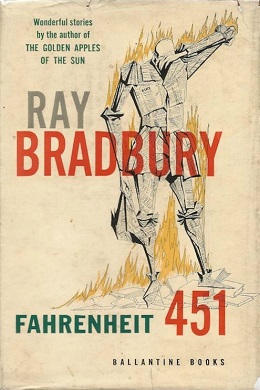Fahrenheit 451

Fahrenheit 451 is a 1953 dystopian novel by American writer Ray Bradbury. Often regarded as one of his best works,[4] the novel presents a future American society where books are outlawed and “firemen” burn any that are found.[5] The book’s tagline explains the title as “‘the temperature at which book paper catches fire, and burns”: the autoignition temperature of paper. The lead character, Guy Montag, is a fireman who becomes disillusioned with his role of censoring literature and destroying knowledge, eventually quitting his job and committing himself to the preservation of literary and cultural writings.
The novel has been the subject of interpretations focusing on the historical role of book burning in suppressing dissenting ideas for change. In a 1956 radio interview,[6] Bradbury said that he wrote Fahrenheit 451 because of his concerns at the time (during the McCarthy era) about the threat of book burning in the United States. In later years, he described the book as a commentary on how mass media reduces interest in reading literature.[7]
In 1954, Fahrenheit 451 won the American Academy of Arts and Letters Award in Literature and the Commonwealth Club of California Gold Medal.[8][9][10] It later won the Prometheus “Hall of Fame” Award in 1984[11] and a “Retro” Hugo Award, one of a limited number of Best Novel Retro Hugos ever given, in 2004.[12] Bradbury was honored with a Spoken Word Grammy nomination for his 1976 audiobook version.[13]
Adaptations of the novel include François Truffaut’s Fahrenheit 451 (1966 film), Fahrenheit 451 (2018 film) and a 1982 BBC Radio dramatization.[14] Bradbury published a stage play version in 1979 and helped develop a 1984 interactive fiction computer game titled Fahrenheit 451, as well as a collection of his short stories titled A Pleasure to Burn.[15] HBO released a television film based on the novel and written and directed by Ramin Bahrani in 2018.
Guy Montag is a fireman employed to burn houses containing outlawed books. He is married but has no children. One fall night while returning from work, he meets his new neighbour, a teenage girl named Clarisse McClellan, whose free-thinking ideals and liberating spirit cause him to question his life and his own perceived happiness. Montag returns home to find that his wife Mildred has overdosed on sleeping pills, and he calls for medical attention. Two uncaring EMTs pump Mildred’s stomach, drain her poisoned blood, and fill her with new blood. After the EMTs leave to rescue another overdose victim, Montag goes outside and overhears Clarisse and her family talking about the way life is in this hedonistic, illiterate society. Montag’s mind is bombarded with Clarisse’s subversive thoughts and the memory of his wife’s near-death. Over the next few days, Clarisse faithfully meets Montag each night as he walks home. She tells him about how her simple pleasures and interests make her an outcast among her peers and how she is forced to go to therapy for her behavior and thoughts. Montag looks forward to these meetings, and just as he begins to expect them, Clarisse goes missing. He senses something is wrong.[18]
In the following days, while at work with the other firemen ransacking the book-filled house of an old woman and drenching it in kerosene before the inevitable burning, Montag steals a book before any of his coworkers notice. The woman refuses to leave her house and her books, choosing instead to light a match and burn herself alive. Jarred by the woman’s suicide, Montag returns home and hides the stolen book under his pillow. Later, Montag wakes Mildred from her sleep and asks her if she has seen or heard anything about Clarisse McClellan. She reveals that Clarisse’s family moved away after Clarisse was hit by a speeding car and died four days ago. Dismayed by her failure to mention this earlier, Montag uneasily tries to fall asleep. Outside he suspects the presence of “The Mechanical Hound”, an eight-legged[19] robotic dog-like creature that resides in the firehouse and aids the firemen in hunting book hoarders.
Montag awakens ill the next morning. Mildred tries to care for her husband but finds herself more involved in the “parlor wall” entertainment in the living room – large televisions filling the walls. Montag suggests that maybe he should take a break from being a fireman after what happened last night, and Mildred panics over the thought of losing the house and her parlor wall “family”. Captain Beatty, Montag’s fire chief, personally visits Montag to see how he is doing. Sensing his concerns, Beatty recounts the history of how books lost their value and how the firemen were adapted for their current role: over the course of several decades, people began to embrace new media (in this case, film and television), sports, and an ever-quickening pace of life. Books were ruthlessly abridged or degraded to accommodate short attention spans. At the same time, advances in technology resulted in nearly all buildings being made out of fireproof materials, and the traditional role of firemen in preventing fires was no longer necessary. The government instead turned the firemen into officers of society’s peace of mind: instead of putting out fires, they became responsible for starting them, specifically for the purpose of burning books, which were condemned as sources of confusing and depressing thoughts that only complicated people’s lives. After an awkward exchange between Mildred and Montag over the book hidden under Montag’s pillow, Beatty becomes suspicious and casually adds a passing threat as he leaves, telling Montag that if a fireman had a book, he would be asked to burn it within the next 24 hours. If he refused, the other firemen would come and burn it for him. The encounter leaves Montag shaken.
